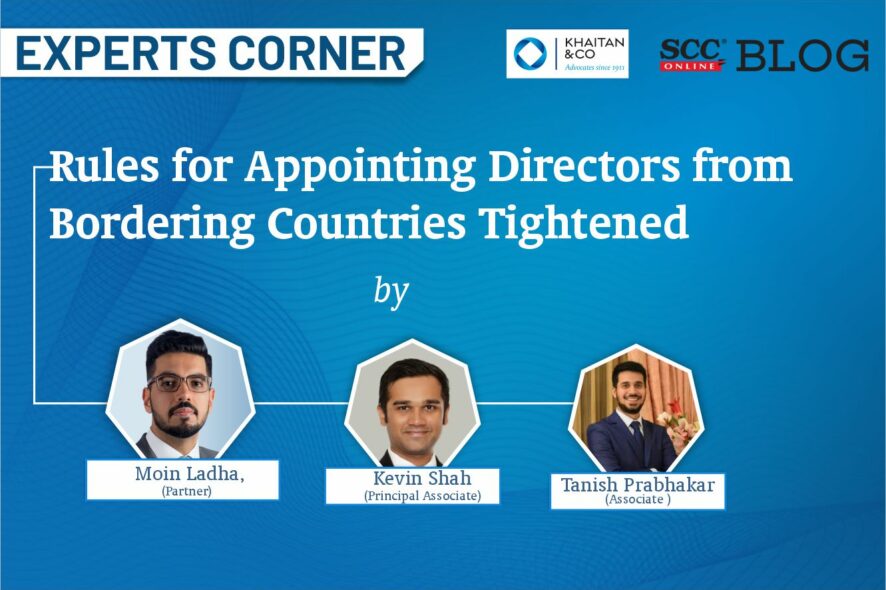Introduction
In furtherance of Press Note No. 3 (2020 Series) (PN 3) which announced a critical change to the consolidated foreign direct investment policy to curb opportunistic takeover of stressed and strategic assets, or Indian entities in light of the impact of COVID-19 Pandemic, on 1-6-2022, the Ministry of Corporate Affairs (MCA) has notified amendments to the Companies (Appointment and Qualification of Directors) Rules, 2014 (Rules), by way of the Companies (Appointment and Qualification of Directors) Amendment Rules, 2022 (2022 Amendment).
The 2022 Amendment has extended the change brought in by PN 3 to individuals who are nationals of a country which shares land border with India and who may occupy directorship positions of a company incorporated in India (Indian entity). Pursuant to the 2022 Amendment, every individual who is a national of a country which shares a land border with India [neighbouring national(s)] is now required to obtain a prior security clearance from the Ministry of Home Affairs, if such neighbouring national seeks to obtain a director identification number (DIN) or to be appointed as a director of an Indian entity.
Additionally, every individual seeking to be appointed on the board of an Indian entity is now required to give a declaration to such Indian entity as to whether or not such individual is required to obtain a security clearance from the Ministry of Home Affairs.
Analysis
PN 3 had introduced certain protectionist measures against investments from countries sharing land borders with India. In view of the PN 3 restrictions, approval of the Government is required for both primary and secondary investments by non-resident entities from, or entities whose beneficial owners belong to, countries sharing land borders with India. Now, with the 2022 Amendment, an additional layer of checks and balances has been added requiring even neighbouring nationals seeking to be appointed as directors to obtain a security clearance from the Ministry of Home Affairs.
It is pertinent to note that even to apply for a directors identification number (DIN), the neighbouring nationals are required to attach such security clearance along with the prescribed Form DIR-3.
Additionally, the security clearance is also required to be attached by the neighbouring nationals at the time of issuing the consent in Form DIR-2 to be appointed as a director in an Indian entity. Furthermore, every individual seeking to be appointed as a director on the board of any Indian entity is now required to provide a self-declaration, both in Form DIR-2 and Form DIR-3 stating whether or not such individual is required to obtain such security clearance.
The amendment only refers to new appointments of neighbouring nationals as directors of Indian entities on a going forward basis and is silent about existing neighbouring nationals who are already directors on the board of an Indian entity or existing neighbouring nationals holding DIN. Notwithstanding this limited grandfathering, one consequence could be that reappointment of existing directors after the end of their existing term would also be hit by the requirements set out under the 2022 Amendment and create uncertainty both from a timing and eligibility perspective.
Comments
PN 3 was issued in the backdrop of the COVID-19 Pandemic with the primary intent being to stem any opportunistic attempts to take control of Indian firms which have been affected by COVID-19.
While the investment ecosystem is already grappling with the ramifications of PN 3, including extended deal timelines and uncertainty on the ambit of beneficial ownership, with the advent of these new developments pursuant to the 2022 Amendment, the volume of applications from such neighbouring nationals is expected to further rise exponentially. These developments will now further increase timelines where such nationals are seeking to be appointed on the board of Indian entities. It remains to be seen whether such security clearances are forthcoming or not. This will also create challenges for existing entities set up in the pre-PN 3 regime.
In view of the above, we believe parties (both parties seeking to nominate individuals and investee entities) should seek appropriate legal counsel to mitigate any unwarranted hiccups in deal closures due to statutory frameworks.
† Moin Ladha, Partner in the Corporate and Commercial Practice Group in the Mumbai office.
†† Kevin Shah, Principal Associate in the Corporate and Commercial Practice Group in the Mumbai office.
††† Tanish Prabhakar, Associate in the Corporate and Commercial Practice Group in the Mumbai office.



